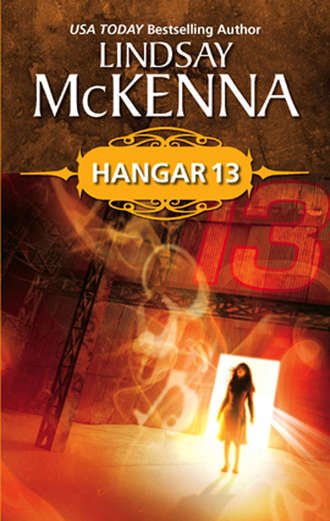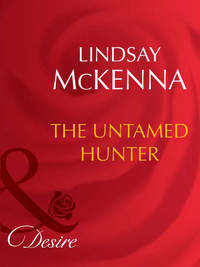
Полная версия
Hangar 13
What did a shamaness do? He’d wondered that all the way over here. He didn’t have a clue and didn’t want to guess. Soul recovery and extraction? It sounded like a visit to the dentist’s office! Smiling, he walked over to the kitchen counter. There were four ceramic canisters, each painted with flowers, making the counter look as if it was in bloom, too. Small pots of cactus sat on the windowsill above the sink.
Looking around the kitchen, Mac decided that Ellie’s home didn’t look particularly out of the ordinary. Sitting down, he heard soft, Native American flute music emanating from another part of the house. Somehow, the picture he had of Ellie just didn’t jibe with what he was observing. Tapping his fingers absently on the clean glass surface of the table, Mac noticed the fresh bouquet of wildflowers, some red, some pink and others yellow. He smiled. How long had it been since he’d seen wildflowers? He decided that Ellie was the exact opposite of him: he was a man who owned the sky and loved to live in it. She was a woman of the earth, firmly planted in it, bare feet and all.
“Would you like some coffee?”
Mac jumped. Ellie had entered so quietly he hadn’t heard her. She was still in her bare feet, although now she wore a lightweight denim skirt that grazed her ankles and a fresh, white blouse. Her hair had been brushed, too, the blue-black locks caught up in a loose ponytail with a bright red scarf.
“Yes…please.”
Ellie went to the sink and began to prepare her coffeepot, an old-style one that perked on the electric stove. “So what brings you here, Mr. Stanford?” She turned to him briefly and saw that his darkly tanned face was still tense, his eyes still shadowed.
“Well, I’ve got a problem, and you were suggested as a person who might be able to help me.”
Ellie put the coffee grounds into the basket, put the lid on the pot and placed it on the stove. She got down two cups and set them on the table. Going to the refrigerator, she took out the cream. She sat down and placed the creamer between them on the table. “What problem?” she asked.
Mac cleared his throat. “I’m a little embarrassed to even talk about it, to tell you the truth.”
“Why?” Ellie folded her hands and rested her chin against them. Mac Stanford was blushing again. His cheeks were a dull red color, and she could almost take pity on him—almost, but not quite. He was hiding something from her, and that made her wary. Still, she had to fight a powerful attraction to him. His self-confidence was like sunlight, something that she honored in any person, but his was charismatic—and dangerous—to her.
With a shrug, Mac said, “Normally, I don’t go to a psychic—”
“Excuse me, but I think we need to get our terminology straightened out before we go any further.”
Mac stared at her. “Okay.”
“I’m a shamaness, Mr. Stanford.”
“Isn’t that the same thing?”
“Yes and no. First of all, I’m a healer.” Ellie opened her long, spare hands toward him. “I’m half Eastern Cherokee and half white. I was born and raised on the Cherokee reservation in North Carolina. My mother is a medicine woman for our people, and so is my sister, Diana. I inherited some of my mother’s metaphysical abilities, but they are expressed differently through me than through her or my sister.”
“Metaphysical?” Mac felt like a first grader.
“Meta means ‘beyond the physical or seen world.”’ Ellie pointed to her eyes. “When something is metaphysical, it means that it’s beyond our visual capability.” A slight smile touched her mouth as she pointed to the center of her forehead. “But we all have another ‘eye’ we can see with. This third eye is called the brow chakra. Most people don’t use it. They’re only in tune with the left side of their brain, the side that uses their physical eyes to view the three-dimensional world. But the right brain, the intuitive side, has an eye, too, of sorts. It’s located here, in the center of our forehead.”
“Hold it,” Mac said, raising his hands. “You’ve lost me completely.”
“I don’t really get the feeling you want to know anyway, Mr. Stanford,” Ellie said patiently.
Mac sat back, frowning. Her directness was unsettling to him. Or, maybe more to the point, he wasn’t used to finding this typically male trait in a woman. “You’re right,” he admitted.
“So,” Ellie said, folding her hands and challenging him with her gaze, “why don’t you tell me the real reason you’re here? Are you a police detective? An undercover agent?”
CHAPTER TWO
For the third time, Mac felt heat in his cheeks. How long had it been since he’d blushed? A long time. Maybe before he and Johanna had gotten married. He pushed that painful thought aside. Mac knew he had to be honest with Ellie.
“It’s nothing like that, Ms. O’Gentry.” He frowned and then met her direct, intelligent gaze. Her eyes were a golden brown color, reminding him of sunlight dancing off the surface of water. If Mac didn’t know better, he’d think she was smiling at his predicament. At first, a bit of anger stirred in him, but then he realized it was his own fault that he’d placed himself in this embarrassing position.
“I’m a major in the air force. I fly F-15’s,” he said. “I’m also the maintenance officer for our squadron.” Almost instantly, Mac saw Ellie relax.
“That’s a good start, Major Stanford,” Ellie said. “Go on.” She smiled slightly, because she saw how terribly uncomfortable he was with her—or, more precisely, with what she symbolized. Still, she liked Stanford’s ability to be honest when he was challenged, and that was commendable.
Mac took a deep breath and dove into the story of the flying wrenches in Hangar 13. Ellie sat quietly, without interrupting, while he stumbled through a detailed explanation of the four incidents. She just wasn’t what he’d expected. Mac wasn’t sure what he’d expected, but certainly not this quiet, introspective, intelligent woman whose beauty was more than skin-deep. His gaze kept drifting from her beautiful eyes, framed with thick, black lashes, to her soft mouth. He found it difficult to concentrate on the story when he really wanted to study her instead.
So he divided his attention. He had always been good at that, and Johanna had resented it. She had always accused him of only half listening to her and had said she could sense that his mind was elsewhere. And it was true, Mac acknowledged. But he couldn’t help it—it was part of his nature, part of what made him such a good fighter pilot. His eyes might be on the instruments or on the terrain outside the cockpit canopy, but his hearing was elsewhere, and his physical body was subconsciously recording sensations, too. Mac had tried repeatedly to explain this to Johanna, but she never understood. Or perhaps she had, and just hadn’t been able to accept it.
Ellie was listening with her ears, but she had allowed her senses to blossom fully and take in the complete spectrum of Mac Stanford. She liked that fact that he talked with his hands, that he was animated about the story he was sharing with her. Still, she could see that part of his attention was diverted toward studying her face, and that his interest was on more than just a professional level. Smiling to herself, she admitted that she was just a little interested in Mac Stanford on a personal level, too.
“So,” Mac said, “that’s the story.”
Ellie nodded. “And you’re looking for an explanation for this phenomena, Major?”
“I guess I am. I really don’t know.”
“What you’re really saying is that you don’t believe it could happen in the first place. That the phenomena has to have a human culprit behind it, not a ghostly one.”
“Are you always this direct?”
Ellie grinned. “It pays to be honest, don’t you think, Major?” She saw the amusement come to his hazel eyes and his mouth curve upward briefly. When Mac Stanford smiled, she felt the sunlight of his energy surround her like a warm, soft blanket.
“Yes.” Mac struggled inwardly for a moment. “I guess I’m not used to such directness in a woman like yourself.”
“Really?” Ellie tilted her head, her hands resting against her chin. “What did you expect?”
Uncomfortable, Mac muttered, “I had this picture in my head of an old woman in a gypsy outfit sitting over her crystal ball.”
Ellie laughed. It was a full laugh, rich yet soft.
Mac stared at her as she leaned back in the chair, tilted her head back and allowed the wonderful laughter to escape. In that moment, surrounded by her laughter, he felt an incredible need to know her better—as a woman.
“I can surmise two things about you, Major,” Ellie said, placing her hands on the table and engaging his stare. “First, you don’t believe in what I do any more than you believe the moon is made of green cheese. Secondly, you’re a prove-it-to-me kind of man, totally stuck in his left brain. I’ll bet you dismiss any intuitive thoughts if you can’t prove, weigh or see results. Am I right?”
“I believe what my eyes see,” Mac said, a bit defensively.
“And I don’t. We’re poles apart, Major. I live in worlds that you don’t believe exist.”
“Well—” Mac cleared his throat “—I don’t think that matters in this case. I came to you asking for an explanation. It doesn’t have to be one I believe in.”
“Perhaps,” Ellie said softly.
“I’m here. I think that proves something.”
“Maybe,” she agreed.
Getting a bit frustrated, Mac said, “Tell me what you charge and I’ll pay you for the information.”
She got up, went over to the refrigerator and drew out some vegetables. Twisting to look over her shoulder, she said, “There is no charge, Major.”
“Why not?”
“If I can answer your questions without going into a shamanic-journeying state to do it, I will. I never charge in this kind of a situation.” She began tearing lettuce into small pieces over a large ceramic bowl.
“I don’t know what to make of you.”
Ellie smiled and began cutting up a carrot. “At least you’re honest. That’s a good place to start, Major.” Her ex-husband, Brian, had pretended to be interested in what she did, but it had all been a grand lie for his grand plan. All he really wanted was a companion in bed—and a housekeeper. It soon became clear that Brian didn’t believe in her world, but Ellie had tried to make things work, hoping they could find some kind of common ground. Finally, after three years of Brian’s continuing abuse over her beliefs, she’d had to get out.
“I may not like the truth, Ms. O’Gentry, but it’s better than the alternative.”
Her smile broadened. “That is one thing we agree on completely, Major.”
“Call me Mac, will you?”
“Okay. You can call me Ellie if you want.” She sensed his defensive walls slowly dissolving, and that was good. As he sat sipping the coffee, she could see the questions in his eyes.
“I’m caught between a rock and a hard place,” Mac admitted. In a bittersweet way, he enjoyed watching Ellie prepare the salad. It reminded him of his broken marriage, of a happier time in his life. Mac missed the hominess that marriage had provided him.
But Ellie was nothing like Johanna. She wasn’t modellike as Johanna had been, but reminded Mac of a woman in a Titian painting—ample, curved and rounded in all the right places. Ellie reminded him of a true earth mother.
She placed the salad on the table between them. “Why don’t you get up and set the table, since you’re staying for dinner?”
Mildly shocked, Mac got up. He saw her eyes dancing with laughter.
“Are you stunned because you’re staying for dinner or because I’m asking you to help out?”
He smiled a little sheepishly as he moved to the cupboard that Ellie pointed to. “Both.”
“You don’t wear a wedding ring, but you behave like you’ve been married. Are you divorced?”
Struck by Ellie’s insights, Mac opened the cupboard and took down two white ceramic plates. “Are you psychic?”
Laughing, Ellie shook her head. “No, just a watcher of people in general. I saw this look of longing on your face, and noticed you had no wedding ring on your finger. I figured you were probably divorced and missing the good life that marriage provides.”
“Guilty,” Mac murmured, placing the plates on the table. “I’m divorced, and you’re right—I miss married life.”
“All of it or some of it?” she challenged.
Mac placed flatware at each plate. “Why do I get the impression you’re a feminist?”
“Because where I come from, there is none of this ‘man rules the roost.’ My people are matriarchal, and that means women are held in just as high esteem as any man. We own the land, and it’s passed on from one woman to another, instead of from man to man.”
“Reverse of what it is out in the real world.”
“Oh?” Ellie whispered. “My world is just as valid as yours, Major.”
“Touché.” Mac smiled a little and sat back down.
“You’re not done yet, Major.”
“I’m going to earn this dinner, I can tell.”
“And then some.” Ellie pointed to the top of the refrigerator. “Get a couple of those rolls and bring them down. Put them in the microwave, please.”
Ordinarily, Mac might have been annoyed, but he wasn’t. Ellie intrigued him. He liked her use of authority and the way she made him a part of the kitchen—whether he felt he should be helping or not. Johanna had always shooed him out of the kitchen and called him when dinner was ready. Retrieving the rolls, he placed them in the microwave. Then he took a butter dish from the refrigerator and set it on the table.
“Very good,” Ellie praised with a laugh as she put hamburger meat into the skillet she’d heated. “You’re getting the idea.”
“Is this called karma?” he teased as he stood next to her, leaning against the kitchen counter, his hands resting on it.
Ellie nodded. “Our whole life is karma as far as I’m concerned. The people we meet, the ones we work with, the ones we bump into on the street.” She glanced up at his face, which now seemed more relaxed. “Karma is about living life, Major.”
“Mac.”
“Yes…”
“I feel like I’ve stepped into a whole new world here.”
“You have. I’m Native American, raised to respect all people as equal. I’m a shamaness, and I’ve been trained to look at reality very differently than you.”
“I’m a city kid from Portland, Oregon,” Mac admitted. “My father was an electrical engineer until he died of a heart attack at forty-five. My mother stayed at home and raised me and kept house.”
“And I’ll bet she never went out and had a job or a life other than that.”
“Correct.”
“You white men are a spoiled bunch,” Ellie said with a chuckle. “One hamburger or two?”
“Two, please.”
“Manners. That counts with me.”
“Are you always this feisty or is this something special for me?”
“I’m not treating you any differently than I would anyone else—regardless of gender.” Ellie turned the hamburgers in the skillet. “Get the mustard and ketchup from the refrigerator?”
“Sure.” Mac opened the refrigerator door.
“How long have you been divorced?”
Mac hesitated as he placed the ketchup on the table. “Two years.”
“You don’t seem to be over it yet.”
Her insight was unsettling. He paused briefly, then said, “I think if you love someone, it’s tough to leave it behind.”
“The heart never forgets,” Ellie agreed gently, handing him his burgers. “All our good and bad memories are held in it. Come on, let’s eat. I’m starving.”
Mac ate with relish. The baked beans, hamburgers and garden salad were perfect. It had been a long time since he’d had a home-cooked meal. Ellie had a healthy appetite, too, unlike Johanna, who had weighed every ounce of food she ate, always scared of gaining a few pounds. Ellie certainly wasn’t fat, but Mac saw that she truly enjoyed her food and obviously didn’t agonize over caloric content.
“Do you have any grounding in metaphysics, Mac?”
He shook his head. “Absolutely none.”
“With your engineering background, the only thing you know is your left-brain reality.”
“Is that a compliment or an insult?” Mac liked the smile she gave him as she wiped her fingers on her pink cloth napkin.
“Neither. It’s merely an observation.” Ellie pointed to the right side of her head. “I need to give you some basic information so you’ll understand what is potentially happening in your Hangar 13.”
Mac added more ketchup to his second hamburger. “Okay, shoot.”
“Native Americans and women tend to be right-brain dominant. Science has established that the right brain’s function is very different from the left brain’s. The left hemisphere processes information based on logic, on physical evidence from our senses. It can speak to us with a sound, a voice, and we all hear it.” She tapped the right side of her head. “The right brain can’t speak to us in the same way.”
“So,” Mac said, buttering a second roll, “does the right brain ‘talk’ to us?”
“Excellent question,” Ellie praised. “Yes, it does, but in a far-more-subtle form. You’d call it intuition, or a gut feeling. I’m sure you’ve heard talk of women’s intuition. Well, some women are simply more in touch with their right brain. Unfortunately, society doesn’t always take this kind of knowledge seriously.”
“I see.”
“You may ‘see,’ in one way, Mac, but you can’t really understand the process. In the Native American culture, we are taught that women know what they know, and that it is different from how men know the same thing. One way isn’t more right than another.”
“Johanna, my ex-wife, used to tell me that when she was in college, she’d come up with the right answers on her math tests, but she wouldn’t be able to remember the formula or how she got the answer.”
Ellie smiled broadly. “That’s right. That’s the right-brain way—making the quantum leap to the answer. It doesn’t care how it got the answer like the left brain does.”
“She flunked the algebra course because she couldn’t prove how she arrived at the answers.”
“I’m sure she did, because most schools and colleges are based on left-brain thinking.”
“How did you do in school?”
“I was able to stay home and be taught by my mother. Right-brain methods of learning are very different from left-brain methods. My mother used a very practical teaching method with me—show-and-tell. I learned by doing, or what is known as hands-on experience. My father, who is a white man and a plumber by profession, taught me his business as I grew up. I watched him do it, and then mimicked his actions. It was very practical.”
“Not a lot of theory, philosophy or left-brain stuff?”
“Precisely.” Ellie got up and removed their plates. “Would you like a slice of homemade cherry pie?”
Mac grinned sheepishly. “Will I be indicted if I say yes?”
“There’s no guesswork with you,” Ellie said with a chuckle as she removed the cherry pie from a cupboard and cut two thick slices.
“My stomach has always been my downfall,” he admitted. “I like home cooking. There’s nothing wrong with that.”
“There’s nothing wrong with it as long as you help with the cooking and not just the eating.” She smiled and put the plate before him.
“I can’t even boil water. I’d make a crummy cook. Thanks, this looks good.”
“That’s because your mother never made you come into the kitchen and learn to cook.” Ellie sat down and enjoyed the silence that blanketed them while they ate dessert. It was obvious Major Mac Stanford had enjoyed the meal.
“Do you make your own meals?” she wondered aloud.
With a shrug, Mac said, “Usually I go to a restaurant off base for dinner.”
“I see….”
“I’m sure you do.” He liked the sparkle in Ellie’s eyes as he met and held her gaze.
“Let me take it a step further, then. The right brain, scientifically speaking, is the creative side of ourselves. It is the seat of our emotions, our feelings. The left brain is tied into lists, black-and-white issues, practicality and strict visual observation.”
“That’s why women are more emotional than men?”
“I’m not letting you get away with that generality,” Ellie said grimly. “Let’s put the shoe on the other foot, Mac—both genders have both brain hemispheres in their head. There is nothing that says men can’t begin utilizing their right brain more.”
With a groan, Mac said, “Now I get it. This is the sensitive man of the nineties you’re talking about, the one who is using his right brain?”
“And his left.” Ellie waved her fork at him. “Don’t you think it’s better for both genders to use both parts of their brains?”
Mac nodded. “Your argument has some interesting concepts, Ms. O’Gentry, but what does it have to do with my problem in Hangar 13?”
“It has to do with metaphysical law. The left brain’s entire function is to keep our focus—our living, if you will—strictly channeled in this third-dimensional world. It has a filter that stops potential information from any other dimension from coming in and disrupting our reality.”
Mac stared at her. “Okay, so far, so good. You’re saying the left brain puts a certain kind of blinders on us, like you would on a horse pulling a carriage?”
“Exactly. The right brain has no such ‘blinders’ or filter in place, so it’s open to receiving all the information that surrounds us, whether it can be seen with our physical eyes or not.”
“What else is out there that the right lobe perceives?” Mac asked.
“Great question. Science acknowledges that we have at least three dimensions.” Ellie touched the table with her long fingers. “We can see three sides to this table, so three dimensions are involved.”
“Science would agree with you.”
She smiled a little. “The right lobe can see into the fourth dimension, Mac, the one scientists don’t want to confirm exists.” She touched the middle of her forehead. “Remember earlier I told you that the right lobe’s ‘eye’ was located here, the brow chakra?”
“Yes?”
“Well, if a person wants to, he can see through this table, which means he is viewing it through the fourth dimension. But he is ‘seeing’ with this invisible eye here in the center of his forehead. Anyone, with some work, can literally ‘switch’ to his right brain, close his eyes and do this.”
Mac sat back, digesting the wild allegation. She obviously believed that what she was saying was the absolute truth. “I’m having a tough time buying this.”
“Of course you are. Everything in your life has been predicated on left-brain ways. If you can’t see it, weigh it or measure it, it doesn’t exist. Yet—” Ellie smiled “—how do you explain dreams that come true, or a mother knowing her child is in danger or has been hurt before the phone call comes to validate it?”
“Okay…is that right-brain territory? Dreams? Telepathy?”
“Yes.” She was pleased with his ability to catch on quickly. “People utilize their right lobe every day—they just don’t realize it. As a shamaness, I have a special talent for using my right lobe. That’s how I’m able to help people. And now,” Ellie concluded, “back to the drawing board regarding your problem at Hangar 13.” She found herself wanting to ask Mac a lot more personal questions, because despite his military background, and his very one-sided view of the world, he was trying to comprehend her world, too. She found that praiseworthy.
“The fourth dimension is already acknowledged by the scientific community,” she went on. “Quantum physics is about that dimension. Our right brain has the capacity, the genetic setup, to see into that dimension, just as our physical eyes comprehend the first three dimensions. People like myself who have a strong genetic predisposition to right-brain activity, and who do a lot of personal work developing that lobe, can see into the dimension at will.”
“How is it done?” Mac asked. His curiosity was piqued; he always liked exploring new territory, no matter where it was located.
“The right brain’s ability to perceive the fourth dimension can be triggered in so many ways. For some, it’s achieved through meditation. For others, through hallucinogenic drugs.”








